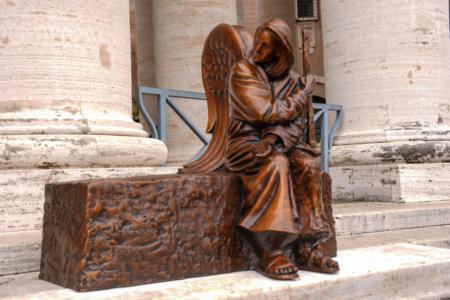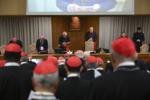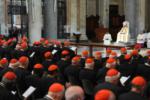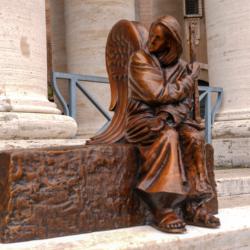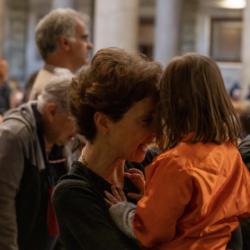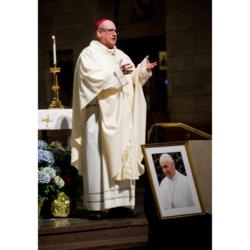Stem-cell, cloning bill sent to governor
Unless 16 legislators in the Massachusetts House decide to withdraw their support for the stem-cell research bill, legislative leaders will have the two-thirds majority necessary to override Gov. Mitt Romney’s expected veto. Representatives joined senators in approving the bill that endorses embryonic stem-cell research and therapeutic cloning on March 31. A final version was approved and sent to the governor on May 4 with a vote of 119 to 38. The governor can take up to 10 days to act on the bill.
Maria Parker, interim executive director of the Massachusetts Catholic Conference, said she believes legislators need to hear from those who elected them. The MCC, the public policy arm of the Catholic Church in Massachusetts, has lobbied against the bill from its inception.
“I think it’s very important that our legislators hear from Catholics in the pews because there’s been a great deal of pressure exerted on them in this particular issue and it’s coming from many sources,” she said.
Representatives are accountable to the people, not “a very small but elite group of scientists who may wish to cross over those ethical boundaries in the area of research with no questions asked,” she added.
Parker acknowledged that the bill addresses a “complex, multifaceted issue” and said the issue is difficult to explain in the short period of time that this bill has been debated. The question before the legislature was “When does human life begin?” and legislators chose to believe life does not begin at conception, she said.
She also voiced concern that the bill would promote the exploitation of women who would need to provide the eggs necessary for the research.
“If they can’t be assured of a huge supply of eggs, and we’re talking millions from women, they will not be able to pursue their goals of unlimited cloning because they will lack the materials necessary,” she said. “I am not comforted at all by the kinds of so-called ‘safeguards’ that have been touted as highly regulatory and restrictive and protective of the rights of the embryo.”
Rep. Paul Donato, D-Medford, a Catholic who voted against the bill, also said he, too, is wary of “supposed” safeguards.
Donato opposes therapeutic cloning, also called somatic cell nuclear transfer, a process in which the nucleus of the human egg is removed and replaced it with a nucleus from a donor. The egg is then induced to divide creating an embryo which is a genetic match of the donor. The embryo can then be destroyed to extract stem-cells which could potentially be used to treat a condition of the donor. To date, however, no successful treatments have been developed using this procedure.
If the embryo were implanted in a womb, it could eventually become an adult. This is the same process that was used to clone Dolly the sheep. The stem-cell bill bans this so-called “reproductive cloning,” but Donato said the embryo is still a life, no matter what purpose it is created for.
Donato added that research using stem-cells derived from adult cells and umbilical cord blood should be promoted instead of embryonic research.
“We’re making progress on those to fronts and I think until we continue to exhaust all of that opportunity that we don’t need to research on embryonic stem-cells,” he said.
Several House members who traditionally support pro-life measures voted in favor of the stem-cell research bill. Two, Rep. Kathleen Teahan, D-Whitman, and Rep. James Miceli, D-Wilmington, said they do not believe it is a pro-life issue. Both said they do not see the embryo as a life since it is not fertilized by sperm.
“I’m having a hard time reconciling myself to believe that I’m tampering with human life,” said Miceli. “No one has convinced me yet.”
Miceli said he needs a solid reason in order to equate this issue with the pro-life issue. Although he does not see himself changing his mind, he is still open to discussing the issue, he said.
“I don’t believe it is a life,” said Teahan, who added that she spent many hours “soul-searching” about the issue.
Teahan added that she attended hearings and was committed to learning about the biology behind stem-cell research.
“There’s a lot more to the bill than just the somatic cell nuclear transfer. There’s the umbilical cord banks and the promotion of all the different adult stem cell research,” she continued.
Rep. Paul Loscocco, R-Holliston, said alternatives to obtaining stem-cells through therapeutic cloning should be explored. Loscocco, also a Catholic, said through somatic cell nuclear transfer human life will be created by the millions, grown as commodities and harvested.
“I think it is inherently wrong to be creating life for the sole purpose of destroying it,” he said. “I’m actually very concerned we’re going down the wrong path.”
This bill takes the first step down that path setting up what he called an “arbitrary” standard that embryos over 14 days old cannot be used in the research. Future legislation could extend that that limit to include 30-day-old embryos — the age at which a female embryo already possesses all the eggs she will ever have. Those embryos could then be harvested for eggs, he said.
“Once you’ve made a decision that it’s okay to cross this line. It’s foolish to think that we won’t be back considering [it],” Loscocco said.
